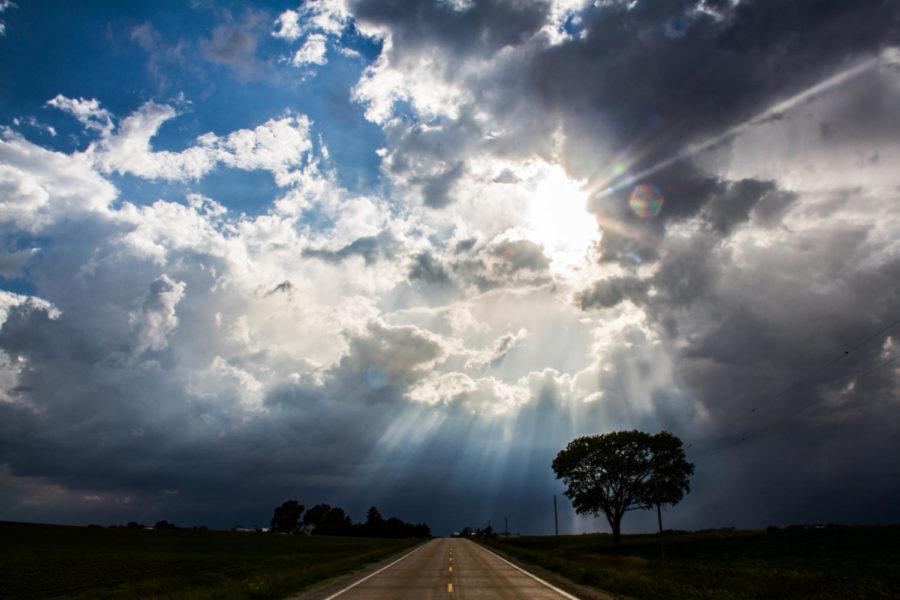United Nations climate report details environmental disasters by 2040
The sun breaks through the clouds before a storm June 14 just outside of Ames.
October 17, 2018
A United Nations-issued report on climate change predicts increased wildfires, drought and massive die off of coral reefs if the priorities of the world economy are not drastically changed by 2040.
The report, commissioned by the UN Intergovernmental Panel on Climate Change (IPCC) was released Oct. 7.
The IPCC is the UN body for evaluating the science related to climate change and, “to provide policymakers with regular scientific assessments concerning climate change,” according to the IPCC press release.
According to the report, if greenhouse gas emissions continue to rise at the rate they are now, the atmospheric temperature will rise 2.7 degrees Fahrenheit above pre-industrial levels by 2040. The impacts of these global temperature increases include intensified droughts in certain areas, rising sea levels, the dying of coral reefs and increased poverty.
The report says in order to prevent these natural disasters, “global net human-caused emissions of carbon dioxide” must be reduced by about 45 percent from the point levels were in 2010 by 2030, and levels would have to be “net zero” by around the year 2050.
Currently the use of coal as an electric source is nearly 40 percent and will have to drop by one to seven percent by 2050, the report states. Alternative energy sources such as wind and solar make up about 20 percent of the world’s electricity mix today and would need to increase to nearly 67 percent, according to the report.
The report estimates that the action taken to prevent the increase of greenhouse gases could cost the world economy nearly $54 trillion.
Alan Wanamaker, associate professor of geological and atmospheric sciences, said scientists are overwhelmed by the data surrounding human-caused climate change,such as the burning of coal for energy.
“The earth is not flat, the planet is warming and people are causing it,” Wanamaker said.
Wanamaker also said it is more important than ever to act and vote for the environment.
William Gutowski, professor of geological and atmospheric sciences, said he was initially concered that people would dismiss the report because it seemed so alarming.
“This is not hopeless,” Gutowski said. “We can take steps but we have to be pretty aggressive.”
The world needs to have a more concerted effort in reducing the use of greenhouse gases, and questions as to what measures are needed, in order to prevent the uses of these gases have to be asked, Gutowski said.
The development of solar, wind and other forms of renewable energy are a step in the right direction and Iowa has been at the forefront of that, Gutowski said.
Gutowski also said people need to remember that the implications caused by climate change have a much greater impact on people living in less developed areas than the U.S. and the U.S specifically has a responsibility to act because of the large amount of greenhouse gases are created by the US.
“The decisions we make today are critical in ensuring a safe and sustainable world for everyone, both now and in the future,” said Debra Roberts, co-chair of IPCC Working Group II, in the IPCC press release.
The authors of the report were 91 scientists from 40 different countries who analyzed over 6,000 different scientific studies, according to the IPCC press release.







